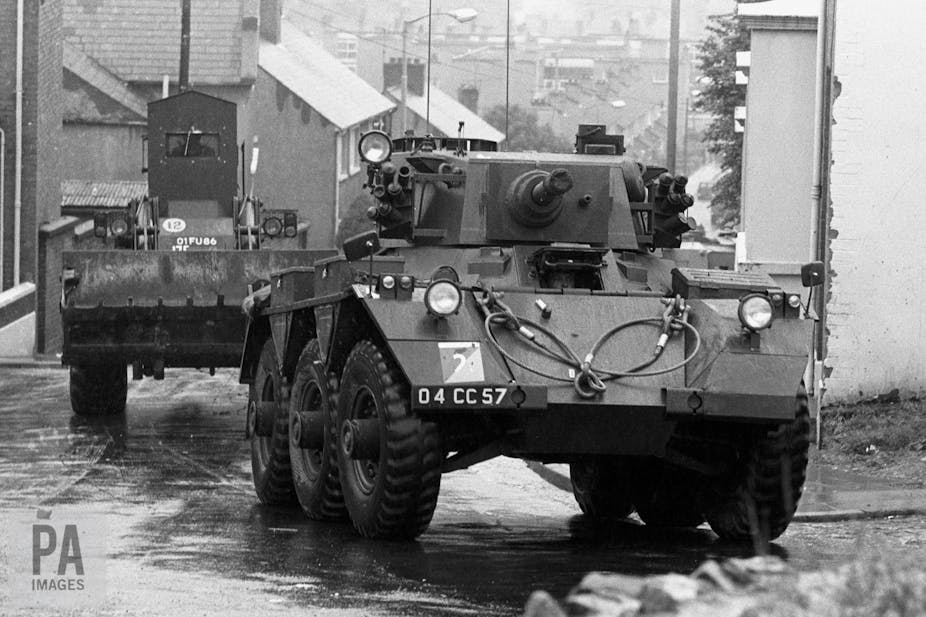Recent disagreement within the British cabinet over Brexit has been further fuelled by the question of how to deal with Northern Ireland’s past. Now there appears to be division over an official consultation document about the mechanisms for addressing legacy issues relating to the conflict known as “the Troubles”. These mechanisms were agreed upon in the 2014 Stormont House Agreement that aimed to break a deadlock in powersharing between unionists and republicans that remains ongoing.
The aim of the consultation – on hold since 2015 – is to inform the legislation that will implement mechanisms, including a new Historical Investigations Unit. The unit will have full police powers in all “criminal investigations” it undertakes into deaths related to the conflict. Its remit, as currently understood, is to take on cases that weren’t completed by the Historical Enquiries Team (HET) – the policing body wound up in late 2014 that had previously been investigating legacy cases, since replaced by the PSNI Legacy Investigations Branch (LIB).
It will also take on legacy cases of the Police Ombudsman for Northern Ireland, and other cases where new evidence has emerged that was not put before the HET investigators. And it will be tasked with re-investigating previous HET investigations that were flawed. Its aim is to bring cases forward for prosecution, though the decision to prosecute will remain with the Public Prosecution Service.
Accusations of bias
The current disagreement within the cabinet relates to the omission of a proposed amnesty for British soldiers accused of unlawful killings that was expected to be part of the consultation paper.
There are questions as to whether the type of amnesty for British soldiers initially sought by the British government is legal under international law. Expert opinion given to MPs on the Defence Select Committee in 2017, indicated that a one-sided amnesty that was not linked to wider truth recovery would be open to legal challenge. Amid concerns that this might lead to an extension of protection to paramilitary groups, unionist politicians suggested a statute of limitations that would only apply to British soldiers already cleared by a previous investigation. Again, this is legally questionable.
The political backdrop to the issue mirrors wider politicking over dealing with the past. The British government has previously spoken of a “pernicious counter narrative” that is trying to blame the state for the conflict in Northern Ireland.
On the back of this, on May 9, British Prime Minister Theresa May said that the current process of investigating legacy cases is “patently unfair” and biased against military veterans. The hardline Democratic Unionist Party have also claimed that 90% of the Legacy Investigations Branch caseload focused on cases involving the British Army.
However, figures relating to the investigation of deaths related to the conflict have challenged claims of a bias. Figures obtained by the BBC in 2017 show that of the 1,118 killings being investigated by the LIB, 530 were attributed to Irish republicans, 271 to loyalists, 354 attributed to the security forces and 33 were unknown. Figures relating to the completed HET caseload showed that of the 1,615 cases undertaken, 1,038 were attributed to Irish republicans, 536 to loyalists, 32 attributed to the British Army and nine were unknown. Those attributed to the Royal Ulster Constabulary are investigated by the Police Ombudsman for Northern Ireland.

Public Prosecution Service figures also show that of the 17 prosecutorial decisions taken since 2011, 11 relate to paramilitary groups, with a decision not to prosecute being taken in half the cases relating to members of the security forces. In fact, to date no member of the security forces has been convicted in relation to a legacy case. A handful of former paramilitaries have. However, on May 10, one former soldier, Dennis Hutchings, was told he would stand trial for a killing in 1974.
Put human rights at the centre
Central to the argument of those championing a statute of limitations is the notion that members of the security services should not be re-investigated if previous investigations have cleared them. There are also arguments about previous assurances given to soldiers that they would not face trial.
But this disregards an important point. The HET investigations into many cases involving the security forces have been shown to be flawed, something accepted by Her Majesty’s Inspectorate of the Constabulary. Meanwhile, the independence of the LIB continues to be questioned.
Essentially, the matter hinges on securing investigations into deaths related to the conflict in Northern Ireland that are compliant with human rights law. These investigations must satisfy the state’s obligation to hold an independent investigation under Article 2 of the European Convention on Human Rights.
Researchers, human rights activists and lawyers working on how to deal with the past in Northern Ireland have stressed the need for the new unit to retain independence from the government and not to be hamstrung by national security restraints. This would stand in contrast to previous investigations by the HET and to ongoing investigations by the LIB.
In the context of ongoing legal and political wrangling over the issue, it’s unclear whether or not the Historical Investigations Unit will deliver what it was initially set out to do.

